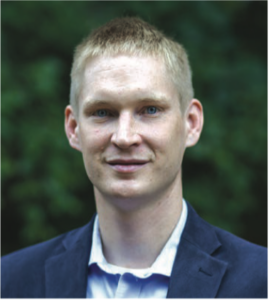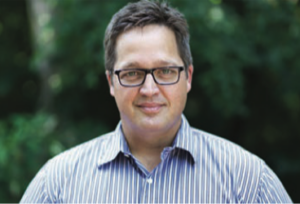New Faces at Calvin Seminary – Fall 2016
Published by Calvin Seminary
Mitchell Schroder, Gift Official and Annual Fund Leader

Mitchell Schroder joined Calvin Seminary last fall as Gift Official and Annual Fund Leader. Mitchell graduated from Calvin College in 2016 with a B.A. in Small Business and a minor in Accounting. Mitchell, who grew up in the CRC, has a passion for the denomination and notes the challenge faced by increasing apathy towards supporting particular denominations. He is excited to push against that challenge by serving in the CRC and feels his gifts for building relationships are ideally suited for fundraising. In his spare time, Mitchell loves swimming, a sport that was deeply important to him in both high school and college, and serves as varsity coach of Grand Rapids Christian High’s female swim team. Mitchell and his wife Janel worship at LaGrave Avenue CRC.
Matthew Tuininga, Assistant Professor of Moral Theology
 “I can’t imagine anything I’d rather be doing,” reflects Prof. Matthew Tuininga, who was appointed last summer as Assistant Professor of Moral Theology. Indeed, it seems plain that God’s hand has, throughout Tuininga’s life, prepared and equipped him for his current vocation. Growing up the son of a pastor in the Reformed tradition, Tuininga is grateful for “all the wealth of the Reformed tradition” that was formative in his early years, and speaks of a “lifelong desire to subject even our own loyalties and communities to the demands of following Christ.” After graduating with a B.A. in history from Covenant College, Tuininga completed an M.Div. degree at Westminster Seminary in California and went on to complete a PhD in Religion, Ethics, and Society from Emory University. Completing his PhD at Emory, he says, allowed him to “wrestle with the meaning of the gospel and of the Reformed tradition in the context of a major research university.” Tuininga further has hands-on experience working in fields where ethical questions are particularly pressing, including a year working as a congressional aide in Washington, D.C., and another year serving as a counterterrorism intelligence analyst for the Federal Bureau of Investigation (FBI).
“I can’t imagine anything I’d rather be doing,” reflects Prof. Matthew Tuininga, who was appointed last summer as Assistant Professor of Moral Theology. Indeed, it seems plain that God’s hand has, throughout Tuininga’s life, prepared and equipped him for his current vocation. Growing up the son of a pastor in the Reformed tradition, Tuininga is grateful for “all the wealth of the Reformed tradition” that was formative in his early years, and speaks of a “lifelong desire to subject even our own loyalties and communities to the demands of following Christ.” After graduating with a B.A. in history from Covenant College, Tuininga completed an M.Div. degree at Westminster Seminary in California and went on to complete a PhD in Religion, Ethics, and Society from Emory University. Completing his PhD at Emory, he says, allowed him to “wrestle with the meaning of the gospel and of the Reformed tradition in the context of a major research university.” Tuininga further has hands-on experience working in fields where ethical questions are particularly pressing, including a year working as a congressional aide in Washington, D.C., and another year serving as a counterterrorism intelligence analyst for the Federal Bureau of Investigation (FBI).
Prof. Tuininga is eager to apply this wealth of experience to the weighty ethical questions facing the church today, as Christians seek to be faithful to Christ amidst the pressures of an “increasingly post-Christian and pluralistic age.” Tuininga acknowledges the church today is facing a unique crisis in its witness: “Western society has rested on traditional Christian teachings, especially in areas of ethics and morality, for so long, that we haven’t had to think very much about why Christians believe what they do, and why it matters for human life. For too long we’ve simply relied on knowing the right answers from the Bible, as if the Bible was a mere ethics manual. And now that our culture is abandoning Christianity, we don’t know how to communicate the gospel vision in compelling, understandable ways anymore.”
A second challenge facing the church’s witness, Tuininga continued, is the church’s own compromising relationship to power: “The church has gotten so comfortable, so used to being in power, that we don’t really see the Christian life as a life of suffering, of cross-bearing anymore. We are very influenced by the American dream, by the pursuit of happiness and fulfillment. And so when the gospel demands hard things of us—with our possessions, with our sexuality, with our comfort, with our use of power—we are not really prepared to fulfill those demands. We aren’t really prepared to take up our cross, deny ourselves, and follow Christ.”
Within this cultural context, Tuininga feels that the CRC and Calvin Seminary in particular, with their rich roots in the Reformed tradition, are ideally suited to shape Christian leaders who are faithful witnesses to Christ. In the classroom, Tuininga strives to “get students engaged in the drama of any particular question”—that is, why the issue matters and the core issues at stake. As students enter the questions opened up by ethical dilemmas, Tuininga focuses on approaching any issue from a Christocentric paradigm: “It’s not enough just to have the right answers. We need to understand the gospel and what it means to be conformed to the image of Christ.” Tuininga also challenges students to reflect, “How is the gospel good news in this area?” Approaching ethical questions using such overarching paradigms allows Christians to demonstrate unity even on matters where faithful Christians differ in opinion by “seeking to transcend our divisions and the narrow perspectives that arise from them, by discerning how it is that different groups of Christians have properly understood the meaning of the gospel in different ways.”
When asked about his ultimate goal for students, Tuininga replied, “I want them to grasp how important it is to focus on following Christ, on being conformed to His image, and on being knit together as His body—in short, to seek first His kingdom and its righteousness—as the centerpiece of our mission in life and ministry.” Only with such a focus, Tuininga emphasizes, can the church be a compelling witness to Christ “in a world that desperately needs to hear and experience good news.”
Elizabeth Lopez, Administrative Assistant to the Certificate in Hispanic Ministry Program

Elizabeth Lopez joined Calvin Seminary this May. Elizabeth has a B.A. in Education and Business Administration from Great Lakes Christian College, as well as over fifteen years of administrative experience and five years of experience teaching in private Christian schools. Her primary job duties include developing a library with Spanish language resources and supporting the Hispanic Ministry
Program in a variety of other tasks. She is excited to use her gifts and experience in this position because of her love for encouraging others’ spiritual growth and development. Elizabeth enjoys reading, gardening, fishing with her husband, and serving at her church. She has one son and two grandsons. She and her husband worship at Iglesia Nueva Vida in Grand Rapids.
Geoffrey Vandermolen, Director of Vocational Formation
 Dr. Geoffrey Vandermolen was appointed to serve at the seminary last summer in a new role as the Director of Vocational Formation. This position, Vandermolen notes, aligns with Calvin Seminary’s strong desire to “place at the core of the curriculum a focus on the intersection of students’ academic learning and their formation as leaders and people.”
Dr. Geoffrey Vandermolen was appointed to serve at the seminary last summer in a new role as the Director of Vocational Formation. This position, Vandermolen notes, aligns with Calvin Seminary’s strong desire to “place at the core of the curriculum a focus on the intersection of students’ academic learning and their formation as leaders and people.”
Vandermolen brings a variety of ministry experience to his role including twenty years of ministry in the CRC in a number of settings, including serving as an associate pastor in London, Ontario for four years and following a calling to church planting in Calgary. Most recently, he has served at ClearView, a church in Oakville, Ontario.Throughout his vocational journey, Vandermolen has had a keen interest in leadership development, an interest he pursued by completing a Doctorate in Ministry at Acadia University in the area of leader formation and succession. His vision for his role at the seminary, he says, is to “serve students by helping them be more aware of themselves, better equipped for leadership, and with a greater sense of clarity about what God has made them to do for the sake of His Kingdom.”
When asked which influences shaped his own calling, Vandermolen cites the influence of many people, including mentors, staff teams, and people who “rubbed off some of the hard edges of myself.” Vandermolen says his calling has also been influenced “by the hard, gut-shot moments of powerlessness, inability, and hardship.” These experiences are the reason Vandermolen especially credits the profound shaping brought about by time in prayer—a discipline that “was never something I was passionate about early on, but I became passionate about it by necessity.”
Reflecting on the unique challenges seminary students face today, Vandermolen notes that some vocational challenges are the same as they have always been, including discerning one’s calling and in what area a person is especially suited to serve. But other challenges seem uniquely pronounced today, including “declining churches, rising costs of education, the pluralization of belief, and the complexity of cultural issues in relationship to the gospel of Jesus Christ.” Making wise vocational decisions in the midst of all of these factors can be difficult, so Vandermolen says his philosophy on vocation keeps a central focus on the calling of every Christ follower, namely, “loving obedience to Jesus as His followers.” The result? Vocation is “not a one-size-fits-all pursuit. We are simply called to love Jesus and follow Him. If that means bivocationality, so be it. If that means seminary—get in there. If that means a lead pastor job, working away at ministry in Cambodia, or plowing through life in the suburbs, I think the call of Jesus is to work it out by praying, testing your calling, asking others for input and direction, and even giving yourself the grace to fail now and then.”
Vandermolen says he looks forward to the challenges that come with his new job including teaching leadership courses, working with other faculty to influence and shape emerging leaders, and dreaming of new and effective ways in which Calvin Seminary can better train and equip Kingdom leaders for God’s good work in this world.
Share
Visit Calvin Theological Seminary’s Campus
We can’t wait to host you on campus! Schedule your visit today, or, if you need more time to find a date that works for you, please request information so we can continue the conversation about supporting your calling!
